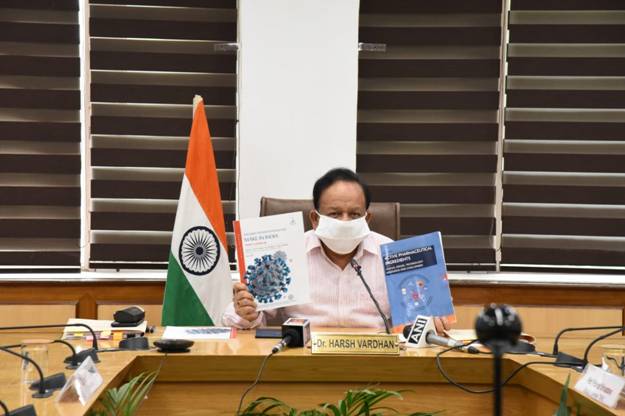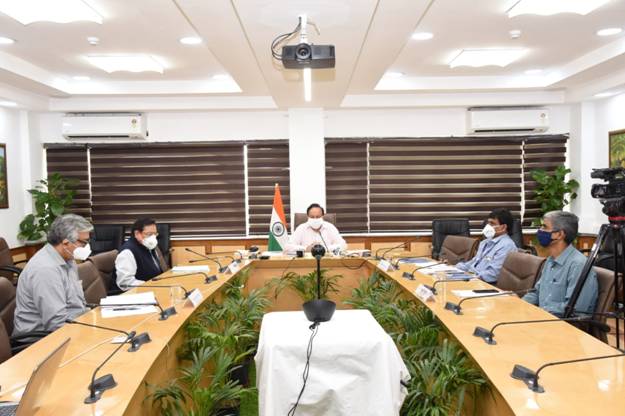Dr. Harsh Vardhan releases White paper on ‘Focused Interventions for ‘Make in India’: Post COVID 19’ by TIFAC
“The current pandemic is global, but the solutions to the challenge should be local.”: Dr. Harsh Vardhan
“I request our Industry friends, Research and Policy Bodies to refer this White Paper in designing the path for upliftment of economy.”: Dr. Harsh Vardhan
The White Paper: “Recommendations are directed towards giving immediate technology and policy impetus to make India ‘ATMANIRBHAR’ “.
Dr. Harsh Vardhan, Union Minister for Science & Technology, Health and Family Welfare and Earth Sciences today released a white paper on “Focused Interventions for ‘Make in India’: Post COVID 19” and “Active Pharmaceutical Ingredients: Status, Issues, Technology Readiness and Challenges”, prepared by Technology Information, Forecasting and Assessment Council (TIFAC), at a virtual function, here. Dr. V K Saraswat, Chairman TIFAC Governing Council, and Prof. Pradeep Srivastava, Executive Director, TIFAC, Dr. Sanjay Singh, Scientist ‘G’ and Shri Mukesh Mathur, Incharge (F&A), TIFAC were also present on the occasion.


Dr. Harsh Vardhan congratulated TIFAC “for bringing out this White Paper document at a right time when India is gearing up for boosting economy with a new Mantra “Local Solutions to Global Challenges - Policy and Technology Imperatives”. “The road to national economy recovery would traverse through measures like Policy support to unconventional strategies, leveraging into new international partnerships in important sectors of Agriculture, Electronics, Health, ICT and Manufacturing and providing new technology stimulus”, he added. Dr. Harsh Vardhan requested “our Industry friends, Research and Policy Bodies to refer this White Paper in designing the path for upliftment of economy.”
Pointing out that “India has been largely successful in mitigating the impacts of COVID-19 so far”, Dr. Harsh Vardhan said, “We got the opportunity to position ourselves as a Global manufacturing hub with a big push under ‘Make In India’ with adoption of appropriate technology and policy reforms and focused thrust in crucial sectors”. He emphasized that “This calls for furthering investment in developing infrastructure, industrialization, strengthening supply chain mechanism, creating demand for goods and services, converting farming into a business proposition etc.” The Minister said, “The current pandemic is global, but the solutions to the challenge should be local.”
Dr. V K Saraswat in his address said that “The White paper has highlighted five sectors that would be critical for India’s economic growth, using technology stimulus and charted out sector specific as well as aggregate policy and technological recommendations.”. He said, “The document also presents models of recovery of Indian economy, leveraging new international partnerships in important sectors based on national priorities and technological strength.”
Prof. Ashutosh Sharma, Secretary, DST, in his message, said, “The White Paper by TIFAC presents a compelling map of high priority sectors, technologies, and strategies to fuel growth in the time of COVID-19 and immediately beyond. The sector-wise reports being worked on currently will also be an invaluable resource in defining the opportunities even more sharply.”
Prof. Pradeep Srivastava, Executive Director, TIFAC gave a power-point presentation and explained that “The white paper by TIFAC will help understand, evaluate and define the impact of the pandemic on the Indian economy and provide policymakers (Government of India) and public with the guidance that can be taken to mitigate the widespread economic shock and boost the Indian economy, cut through the noise of fall and prepare the ground for recovery using self-reliance as the new mantra”.
This White Paper captures sector-specific strengths, market trends, and opportunities in five sectors, critical from the country’s perspective, includes healthcare, machinery, ICT, agriculture, manufacturing, and electronics with reference to supply and demand, self-sufficiency and mass-scale production capacity. It has identified policy options primarily in the areas of Public health system, MSME sector, Global relations: FDI, recalibrated trade alignments, new-age technologies, etc. This is precisely important for the development of technology clusters in champion segments, creating Technology Start-up Exchange, identifying, supporting, and piloting ten blockbuster technologies and collaborating with new dynamics with incubators of Israel, Germany, towards promoting import substitution as well as evolving technology platforms in sunrise technologies. The recommendations are directed towards giving immediate technology and policy impetus to make India “ATMANIRBHAR”. Based on the linkages and interdependencies between the outputs of different sectors, output multiplier and income multiplier for various sectors have been presented in the paper.
For details of the White Paper, please click here.
- PPT
- Full Document
*****
NB/KGS/(DST/TIFAC)